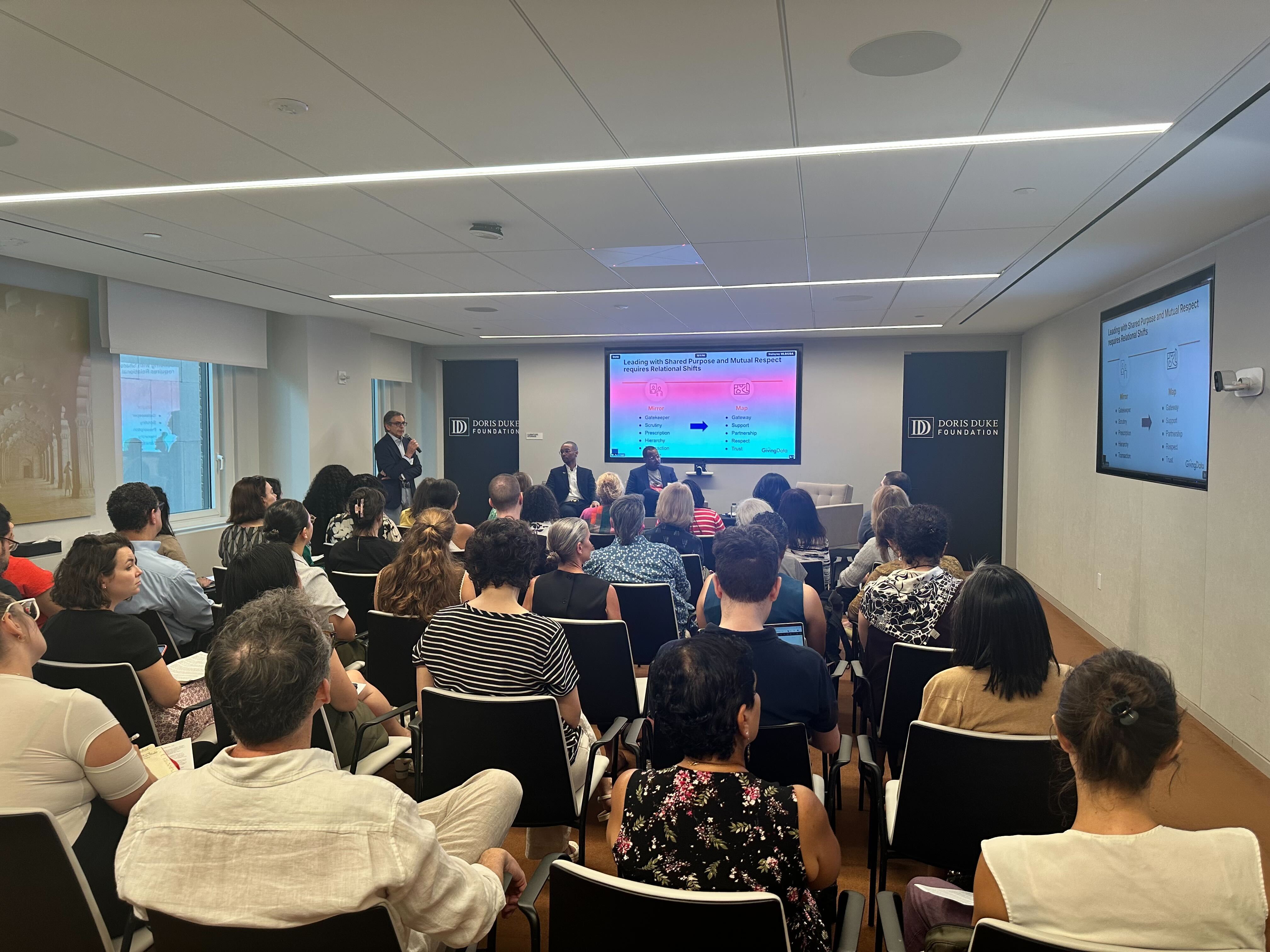
Blog
From Gatekeeping to Gateway: How Funders, Nonprofits, and Boards Are Leading Together
At our recent Lunch, Learn, and Connect at the Doris Duke Center in New York City, funders, nonprofit leaders, and board members gathered to explore how they are leading together across roles, sectors, and lines of power. A central tension and opportunity that surfaced was the call for philanthropy to evolve: from acting as a gatekeeper that controls access and outcomes, to becoming a gateway that opens paths for trust, partnership, and collaboration. This theme, originally explored in a visioning document co-authored by early childhood leaders of color through Promise Venture Studio, became a guiding thread throughout the conversation.
Our Lunch, Learn, and Connect series brings together leaders and changemakers to engage in honest dialogue, build relationships, and learn from each other by sharing practical insights. At our New York City event, the partnership between Barbershop Books, a nonprofit whose mission is to inspire Black boys and other vulnerable children to read, and its board served as a springboard for exploring what it looks like to lead together in practice. Their dynamic offered a compelling example of how trust, transparency, and mutual respect can spark deeper conversations about shifting power and redefining philanthropic relationships.
A Case Study in Collaborative Leadership
The conversation, moderated by Roberto Cremonini, Senior Advisor for Philanthropic Engagement at GivingData, featured a rich dialogue between Alvin Irby, Founder and Executive Director of Barbershop Books, and Roland Kennedy, Jr., Board Chair of Barbershop Books and Director of Grants Management at the Carnegie Corporation of New York. This pairing was intentional: Alvin, a nonprofit founder, and Roland, both a funder and board chair, embody the complex and dynamic relationships that define cross-sector collaboration.
“We didn’t bring Alvin and Roland together by chance,” Roberto noted. “There’s no better combination to explore these dynamics.”
Alvin, who was involved in the creation of the visioning document with Promise Venture Studio, shared how his board has shown up not just with oversight, but with partnership: offering constructive feedback, stepping in with hands-on support when needed, and most importantly, creating a culture where leadership feels supported rather than scrutinized. “When I get emails from my board chair, I don’t feel anxious,” Alvin said. “That’s not something I take for granted.”
Roland described his Board Chair role as a “filter” or someone who protects the executive director’s attention, manages board dynamics, and ensures the board stays focused on what matters. “It’s not just about the dollars,” he said. “It’s about the impact beyond the dollars.”
Reimagining Philanthropic Relationships
"If we want to change the way we lead, it's not a change in process, but a change in relationships." said Roberto. That shift in relationship is what moves us:
|
From |
To |
|
Gatekeeping |
Gateway |
|
Scrutiny |
Support |
|
Prescription |
Partnership |
|
Hierarchy |
Respect |
|
Transaction |
Trust |
If the from column feels familiar, almost like it’s holding up a mirror reflecting how many funders still operate today, then the to column offers something more: it’s a map to help us envision and navigate toward more equitable, trust-based relationships.
What Funders Can Do Differently
Alvin shared a powerful story of a funder who initially set programmatic targets for a grant, only to later apologize and ask a different question: “What do you need to do your work?” In that moment, he said, he felt like the vision of partnership he and his peers had imagined was coming to life.
Both Alvin and Roland emphasized the importance of multi-year, unrestricted funding and the need for funders to listen with humility. Roland urged funders not to abandon equity, even in challenging times. “The deliberate backtracking on equity we’re seeing in the sector—it’s a choice,” he said. “And we can choose differently.”
Lessons for Nonprofit and Foundation Boards
The conversation also offered insights for board members seeking to move from passive oversight to active partnership. Roland described how Barbershop Books transitioned from a working board to a governing board, aligning committee structures with strategic priorities and ensuring board members were in the right committees and roles.
He also emphasized the importance of one-on-one conversations with board members to understand their motivations and ensure alignment with the mission. “Why do you want to support Black boys? What does that really mean to you?”
Moving Forward
As we continue to navigate a challenging and ever-shifting philanthropic landscape, the insights from this conversation offer a roadmap for more equitable, effective, and human-centered leadership. Roberto left attendees with three provocative questions to carry forward, each tailored to their individual roles.
If you're a ...
- Funder: How can your organization act more like a gateway than a gatekeeper?
- Nonprofit Leader: How can you invite partnership with funders without fear of scrutiny?
- Board Member: What would it look like for you to show up as a resource and supporter, not a reviewer?
We’re grateful to Alvin Irby and Roland Kennedy, Jr. for their honesty and leadership, and to all who joined us in New York. If you missed this event, we hope this recap offers a window into the rich and inspiring conversation, and we invite you to join us at a future Lunch, Learn, and Connect.
Sign up for the GivingData Insights Newsletter
Receive actionable insights to streamline your grantmaking processes straight to your inbox.

